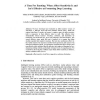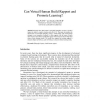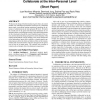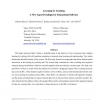29 search results - page 3 / 6 » The Politeness Effect: Pedagogical Agents and Learning Gains |
AIEDU
2004
13 years 5 months ago
2004
Although animated pedagogical agents are frequently found in intelligent tutoring systems and interactive learning environments, their effect on users' attitudes and learning ...
ITS
2010
Springer
13 years 7 months ago
2010
Springer
We have developed and evaluated an affect-sensitive version of AutoTutor, a dialogue based ITS that simulates human tutors. While the original AutoTutor is sensitive to learners’...
AIED
2009
Springer
13 years 8 months ago
2009
Springer
Research show that teacher's nonverbal immediacy can have a positive impact on student's cognitive learning and affect [31]. This paper investigates the effectiveness of ...
ATAL
2008
Springer
13 years 7 months ago
2008
Springer
We discuss the design of the Intermediary Agent's brain, the control module of an embodied conversational virtual peer in a simulation game aimed at providing learning experi...
AAI
2005
13 years 5 months ago
2005
This paper discusses Betty's Brain, a teachable agent in the domain of river ecosystems that combines learning by teaching with self-regulation mentoring to promote deep lear...




